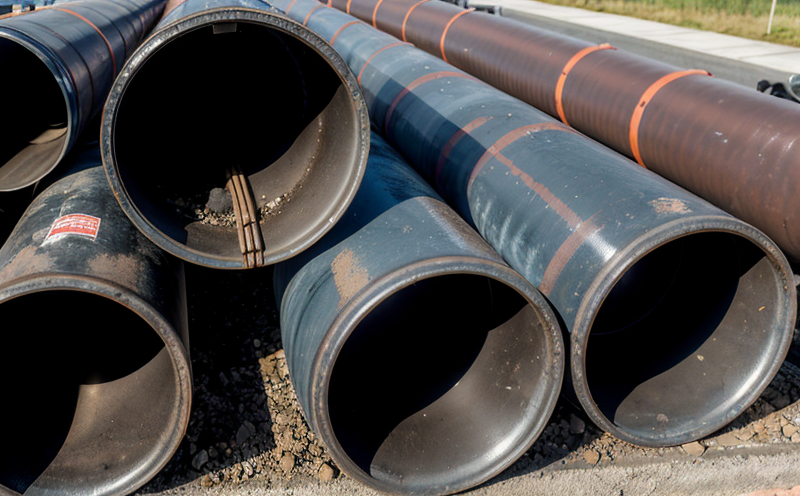JIS K 6743 Tensile Testing of Plastic PVC Pipes
The JIS K 6743 standard is a widely recognized set of procedures used to assess the tensile properties of plastic pipes, including PVC (Polyvinyl Chloride) pipes. This testing method evaluates the ability of the material to resist deformation and fracture under tensile stress. Compliance with this standard ensures that pipe products meet specific quality requirements for strength, durability, and safety.
The JIS K 6743 test is particularly important in sectors like construction, plumbing, and industrial applications where PVC pipes are used extensively. The results from this test help manufacturers ensure their products meet the necessary performance levels required by regulatory bodies and industry standards.
During tensile testing, a sample of the pipe material is subjected to gradually increasing stress until it breaks or reaches its maximum load capacity. This process allows engineers to determine key physical properties such as yield strength, ultimate tensile strength (UTS), elongation at break, and modulus of elasticity. These parameters are critical for understanding how the material will perform under real-world conditions.
In order to conduct a JIS K 6743 compliant test, it is essential that the correct specimen preparation method be followed. Typically, this involves cutting the pipe into parallel samples using precision tools and ensuring that each sample has smooth edges free from burrs or irregularities. The specimens should also be conditioned under controlled environmental conditions before testing to ensure accurate results.
The equipment used for performing JIS K 6743 tensile tests includes a universal testing machine capable of applying precise loads with high accuracy, along with grips that can hold the samples securely during the test. Additionally, software tools may be utilized to record and analyze data throughout the process.
The interpretation of results from a JIS K 6743 tensile test involves comparing the measured values against specified acceptance criteria outlined in the standard. If all parameters fall within acceptable limits, then the material passes the test; otherwise, further investigation or adjustments may be necessary before production can continue.
By adhering to the rigorous procedures set forth by JIS K 6743 tensile testing provides assurance that PVC pipes being manufactured meet strict quality standards. This information is invaluable for manufacturers who strive to produce reliable products that perform consistently across various environments and applications.
Scope and Methodology
The JIS K 6743 standard specifies the procedure for determining the tensile strength of plastic pipes, including PVC pipes. It covers both small-diameter and large-diameter pipes, providing detailed instructions on specimen preparation, testing procedures, and acceptance criteria.
| Parameter | Description |
|---|---|
| Test Method | Universal Testing Machine (UTM) |
| Specimen Preparation | Circular cross-section, 150 mm long |
| Testing Speed | 2 mm/min ± 10% |
| Temperature Range | Room temperature (23°C ± 2°C) |
| Relative Humidity | 50% ± 5% |
The testing method involves clamping the prepared specimen into the UTM grips and applying a slow but steady load until failure occurs. Careful observation of the sample during testing ensures accurate measurement of stress-strain behavior.
Acceptance criteria for passing this test include achieving at least 15 MPa (megapascals) in tensile strength, maintaining elongation within ±2% of expected values, and ensuring no visible defects or anomalies during examination post-test.
Customer Impact and Satisfaction
The implementation of JIS K 6743 tensile testing offers numerous benefits to customers in the construction and plumbing industries. By ensuring that PVC pipes meet stringent quality standards, this process enhances customer confidence in purchasing reliable products.
For quality managers and compliance officers, having access to accurate test results helps them make informed decisions about product specifications and supplier selection. They can rest assured knowing their suppliers are adhering to international best practices.
R&D engineers gain valuable insights into the performance characteristics of different materials through these tests, allowing for continuous improvement in design and manufacturing processes. This leads to safer, more efficient products that better serve end users' needs.
Procurement teams benefit from knowing they are dealing with reputable suppliers who consistently produce high-quality goods. This reduces the risk of defects or failures occurring later on in projects, saving time and money for all parties involved.
User satisfaction is improved when they receive durable, reliable PVC pipes that perform as expected throughout their lifecycle. Positive feedback from satisfied customers translates into repeat business opportunities for suppliers who consistently deliver quality products.
Use Cases and Application Examples
| Use Case | Description |
|---|---|
| Construction Projects | PVC pipes are used extensively in residential, commercial, and industrial construction projects for water supply systems. |
| Plumbing Systems | They form an integral part of plumbing installations, ensuring safe and efficient flow of water throughout buildings. |
| Industrial Applications | PVC pipes are employed in various manufacturing processes where they need to withstand harsh environmental conditions. |
| Agriculture | They facilitate the delivery of irrigation water to crops, enhancing agricultural productivity. |
| Environmental Infrastructure | Useful for constructing drainage systems that manage stormwater runoff effectively. |
| Energy Sector | Incorporated into pipelines transporting petroleum products and other hazardous materials safely. |
The successful completion of JIS K 6743 tensile tests demonstrates the capability of PVC pipes to withstand significant mechanical stress without failing. This reliability is crucial for ensuring long-lasting performance in diverse applications across multiple sectors.





